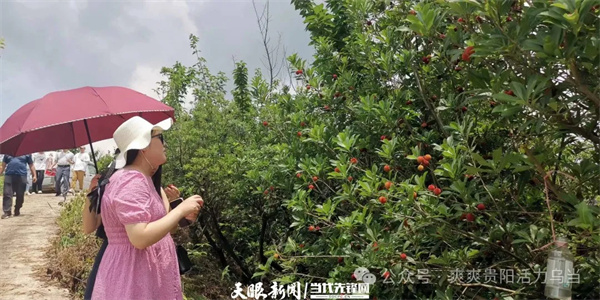Waxberries inject newfound energy into village in Wudang

Visitors flock to Ali village to pick waxberries. [Photo/ddcpc website]
Ali village in Wudang district, Guiyang, capital of Southwest China's Guizhou province, is the city's biggest waxberry production area and is popular as a fruit-picking destination.
However, it once lagged behind the city's other villages due to its limited land resources, until experts discovered that the local forests contain many waxberry trees, with the oldest being four to five hundred years old. This indicated that the area is particularly suitable for growing the fruit. As a result, the village forged a new development path well-suited to its local conditions.
In 1987, the village officially introduced the Biqi waxberry from Zhejiang, while other varieties such as Dongkui waxberry were introduced later on. After nearly 40 years of efforts, the cultivation techniques for waxberry have become mature, making it the pillar industry of the village.
As the village is only eight kilometers from downtown Guiyang, it has become a popular destination for suburban tourism, attracting numerous people to pick waxberries. In order to cater to diverse tourism needs, the village also built a large-scale flower market and started a number of agritainment businesses.
Moreover, the village has been engaged in the cultivation of various fruits such as plums, peaches, loquats and cherries. So far, it has planted 7,000 mu (466.67 hectares) of waxberries and 3,000 mu of other fruits, meaning there is fruit on the market from April to September.
In addition, the growth of flowers and fruits make it easier for bees to collect nectar, leading to some villagers raising bees. These diversified industries have greatly increased villagers' incomes and made the village more prosperous.
Presented by China Daily.
黔ICP备05001922号-3
